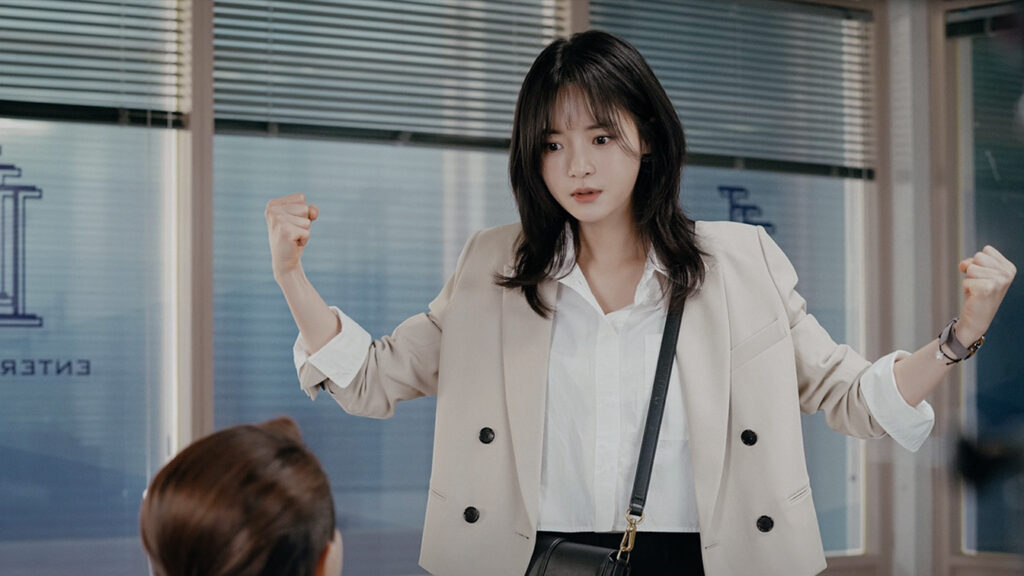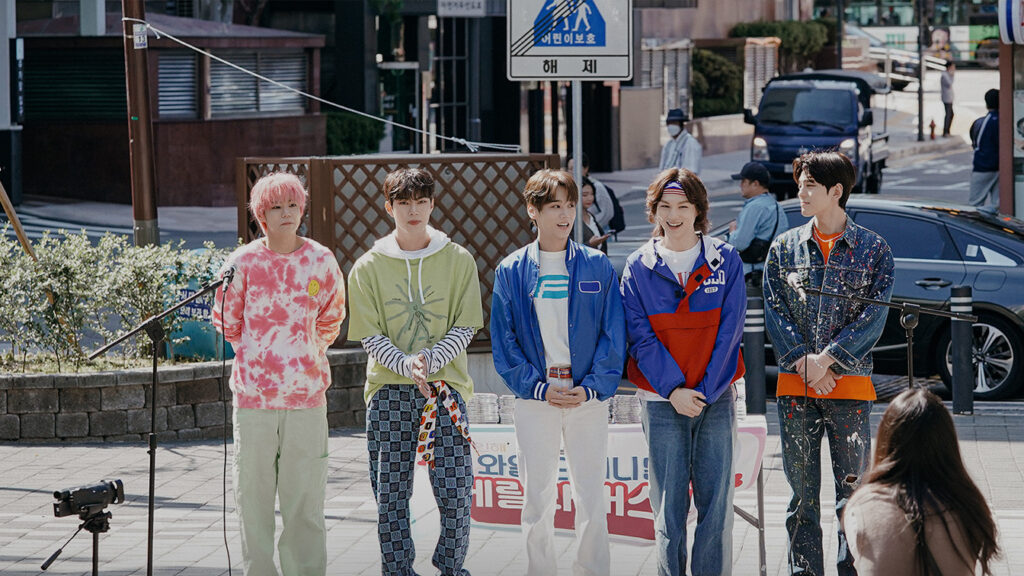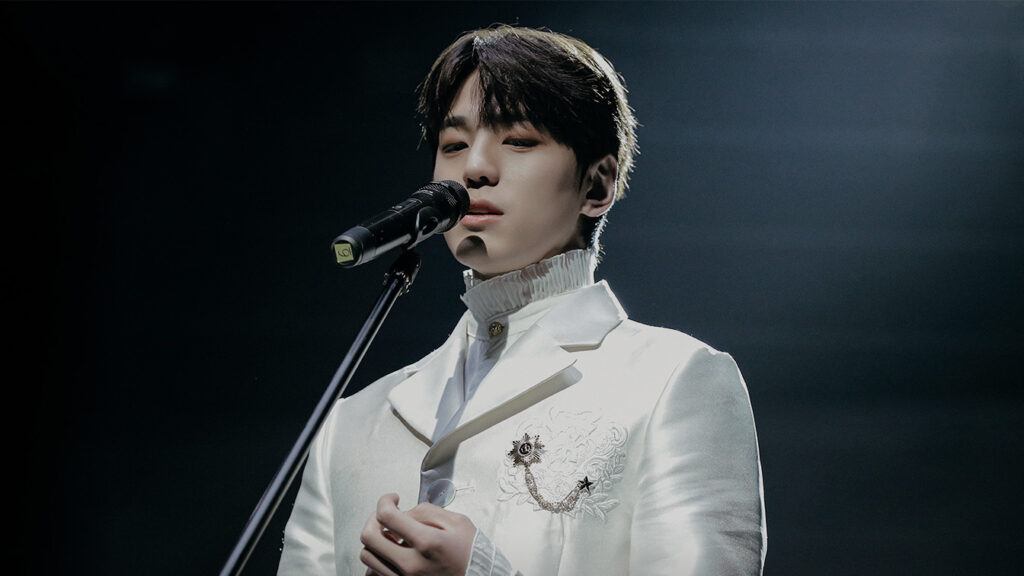
High Priest Lembrary (Kim Min-kyu) lives a fairly pleasant life in the Other World. He is handsome, powerful, compassionate, and admired by countless followers. Serving the deity Redrin, who created the Other World, Lembrary can often be seen spreading his faith and using his divine powers to help people from all walks of life. This serene picture, however, completely falls apart as the King of Evil returns to power after 100 years. As Lembrary and his forces attempt to subdue the Evil One (Lee Jang-woo), he is suddenly transported to the mortal world in the body of a K-pop idol named Woo Yeon-woo.
Thrust in the chaotic entertainment industry and pushed on stage with his fellow members, his brazen statement “I don’t know how to dance!” during a live performance seems to be the last straw for boy group Wild Animal who are on the verge of disbandment. With the Evil One still posing a deadly threat, Lembrary is desperate to return to his original body. Sadly for him, the only way he can do so is to become a famous idol. As one would expect from a holy priest who has no knowledge of how the present world works, Lembrary’s attempts at being an idol are absurd, disastrous, and sometimes downright embarrassing.
This isn’t to say that The Heavenly Idol isn’t enjoyable. In fact, the drama thrives on these wacky situations. The first third of the show is immensely comedic as Lembrary’s honest and upright self enters the K-pop world. While some viewers might be put off by its bizarre plot, it is hysterical for those who can stomach such excessive cheesiness.
However, the drama gradually crumbles when it starts to take itself too seriously with melodramatic backstories and an abundance of confusing fantasy elements.
Note: The following review contains spoilers.
Although The Heavenly Idol is regarded as an adaptation of the popular web novel with the same title, the drama script features numerous changes that reshape plot points, character personalities, and relationship dynamics. Frankly speaking, aside from using the same names and setting, the drama version is so wildly different from the original novel that it might as well be considered a completely different story.
The most apparent change is the inclusion of a love interest for our protagonist which is certainly a curious decision considering Lembrary is a celibate priest.

Our female lead Kim Dal (Go Bo-gyeol) turns out to be a huge fan of Woo Yeon-woo and ends up becoming Wild Animal’s manager with hopes to raise the group’s popularity. For a character that did not exist in the novel, Kim Dal has a surprising amount of depth and personality. She is an interesting addition to the cast and Go Bo-gyeol’s adept performance helps bring this proactive and analytical character to life. Moreover, her interactions with Lembrary are very fun and charming for the most part.
It is a shame that these lighthearted scenes are often cut short to make room for the Evil One’s and religious cult Hongwoodaedae’s bland storylines.
While the writing for Kim Dal’s character is decently developed, the main antagonist feels flat. The Evil One, who appears as RU E&M’s vice chairman Shin Jo-woon in the mortal world, is another major diversion from the original work. Fans of the novel who enjoyed the entertaining bromance between Lembrary and Shin Jo-woon are likely to be disappointed since the character’s new role as a villain changes their relationship entirely. He fails to add anything to the comical side of the story, nor is he convincing as a menacing enemy.
Even with increased screen time in the drama’s second half, his schemes and motives are extremely puzzling. Why is the Evil One so determined to make Lembrary suffer? Why does he not simply kill Lembrary when given the opportunity to do so? What is his connection to Redrin? These questions are answered far too late, reducing his character to a dull and hollow villain for the majority of the drama. Had the pacing of the drama been different, the Evil One could have been given more depth and placed in a sympathetic light with his unrequited love. Instead, we get a plethora of new information and unexpected twists crammed in the last two episodes which severely diminish the impact of the Evil One’s pitiful demise. Unfortunately, Lee Jang-woo’s sincere performance isn’t enough to salvage this lackluster character.

Furthermore, the villainous subplots not only take away screen time from the underdeveloped romance between the main characters but also Wild Animal’s amusing group dynamic. The members and their backstories are underutilized, and the poor boys cannot even complete one full performance without something going terribly wrong.
Despite the drama’s obvious lack of time, the script still squeezes in other idol narratives. In episode eight, we are introduced to another K-pop group called Evil Boys, who have experienced a sudden boost in popularity. As it turns out, their success is due to a contract the members signed to give their souls to Hongwoodaedae. As a result, the members transform into goblin-like monsters little by little as their recognition grows. But, like most of the subplots in the drama, their story ends on an unsatisfying note.
For all the drama’s drawbacks, the portions focusing on mental health and the struggles of being in the entertainment industry are fairly engaging. These moments still only scratch the surface, considering the seriousness of the topic, but they are better implemented than the other arcs in the drama.

When Lembrary believes himself to be useless after losing his divine power in episode ten, Kim Dal assures him that is not the case. Dealing with past trauma, Kim Dal was able to gain hope by being a fan of Woo Yeon-woo and, even more so, by Lembrary who was by her side during her worst times. Extraordinary divine power isn’t necessary to heal people, and sometimes just being present for others is enough.
All in all, the charming story of The Heavenly Idol is ultimately squandered by a bewildering script, poor pacing, and a conflicting mix of genres. The drama genuinely had a lot of potential as its first few episodes showed, and it could have been a great experience if directed differently or extended to additional episodes. The Heavenly Idol is a stellar example of a strong premise with weak execution.
(YouTube. Images via tvN)


